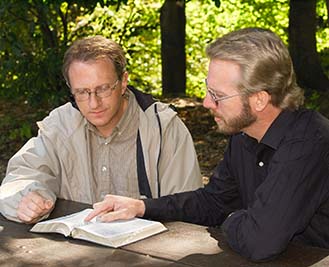By Alfred Bouter
Thinking of the history of Israel,
we know that God, using a series of miracles, delivered the nation from bondage
in Egypt. Then He had Moses lead the people through the wilderness before they
conquered the Promised Land under Joshua’s leadership. We read in the book of
Judges that failures followed after Joshua’s death – that book closing with
solemn words: “In those days there was no king in Israel, everyone did what was
right in his own eyes” (17:6, 21:25 NKJV). During those
many decades of general failure, and notably under Eli’s leadership, the
Philistines captured the ark and “the glory … departed from Israel” (read 1
Sam. 4).
In those days of failure God prepared one who would serve Him: Samuel. This
faithful prophet led the people to repent. Yet, after that revival the leaders
asked for a king according to their ideas, rejecting Samuel as well as the LORD God always has events and things in His hand, and His
thoughts are higher than ours. Therefore He gave the people their choice in the
person of Saul, from the tribe of Benjamin. After some initial victories, it
soon became evident that this man was not really God’s choice, and God
confirmed this twice when Saul refused to obey (1 Sam. 13:1-14, 15:1-29).
In between these two chapters about failures, we read about Jonathan’s great
victory. By faith, together with his armor bearer, the two men made a surprise
attack against the Philistines and won. It is a beautiful object lesson for us
now just as it was for Saul then. Sadly, even in this story Saul failed several
times because of his lack of faith.
After Saul failed the final test, because of his disobedience, the LORD sent Samuel the prophet to Bethlehem on a secret mission.
It was to anoint a young man, David, to be the future king of Israel in place
of Saul. Shortly thereafter, this lad had an amazing victory over Goliath (1
Sam. 17). But soon King Saul began to persecute David. Even though the king had
given David a high-ranking position in the army and in his court, Saul became
suspicious and jealous and tried to kill him several times.
The situation became so bad that Saul tried to kill Samuel the prophet and
even his own son Jonathan (19:18-22, 20:30-33). Saul had 85 priests of the LORD killed, claiming that they had joined with David in a plot
against himself (22:6-19). Thus David, even though he was son-in-law to the
king, was forced to leave Saul’s service and flee. As he had no safe place in
Israel, David went to the Philistines, of all people. Even outside Saul’s
territory, in Gath, the city of Goliath, David was in extreme danger, and it
was from there he fled to the cave of Adullam.1
A Center Of Attraction And Of Formation
It was humiliating for the king, whom God described as “a man after My own heart”
(Acts 13:22), to have to flee from his family, friends and favorite places to a
cave. Yet this cave2 became a God-appointed
center of attraction and formation – the school of God for David and many
others while providing numerous lessons for us today. The cave of Adullam was
not something David had prearranged on his road to kingship, but it was part of
what our all-wise God had planned – a refuge in the whirlwind of events over
which He had full control.
First Samuel 22:1-2 recaps David’s escape from the fierce anger of King
Saul. No one was safe from this king’s unpredictable wrath, including David’s
close relatives. They all “went down” to stay with David in the cave at
Adullam. Many other people escaped3 to him
too. He became their leader, companion and closest friend, he himself being
close to the Lord as we learn from two psalms he composed there: Psalms 57 and
142. At least three of David’s relatives, sons of his half-sister Zeruiah,
became devoted helpers. All who joined David had been discouraged by Saul’s
harsh rule, and they were now, if not before, facing the threat of death.
Their situation reminds us of the words of our Lord Jesus after the leaders
of His people had rejected Him: “Come to Me, all you who labor and are heavy
laden, and I will give you rest” (Mt. 11:28). The rejected Lord became an abode
of refuge for those who had fled from all kinds of difficulties, having been
oppressed by the many burdens the religious leaders had put on them.
A remarkable parallel exists between the rejected Lord Jesus and David in
his rejection.4 David’s close relatives were
in danger under Saul’s rule and sought him. Others, too, came to him in their
distress, anguish, trouble and adversity. The Holy Spirit emphasized the word
“everyone.” “Everyone in distress, and everyone that was in debt, and everyone
of embittered5 spirit” (1 Sam. 22:2 JND) – in whatever difficulty, they came to David.
We note however that Jonathan, the crown prince and David’s closest friend,
whose life was in danger as well, did not go to the cave. After David’s victory
over Goliath, Jonathan had given David his complete armor (18:4), except his
shoes. This is significant since it indicated, at least in a symbolic way, that
Jonathan would not accompany David as a fugitive. Jonathan was not indifferent
to his friend’s situation, and he later visited him at a secret location, but
he returned to the palace rather than going with David (23:16-18).
The Center Of Gathering And The Captain
With amazing precision, using two keywords, the Holy Spirit illustrated the
important concepts of gathering and leadership. Those who joined David
“gathered” (NKJV) themselves – they were collected or
assembled together – and were drawn to him. This reminds us of what the Lord
Jesus said, “Where two or three are gathered together in My name, I am there in
the midst of them” (Mt. 18:20). The Lord Jesus is in heaven, crowned with glory
and honor (Heb. 2:9). From there He sent the Holy Spirit to this earth, who is
doing the gathering to bring us together around the true David, our Lord Jesus
Christ. We are attracted to His wonderful person and name.
As to leadership we read that David “became captain over them” (1 Sam.
22:2). “Captain” is often translated “prince”; and one of Messiah’s, or
Christ’s, names is “Prince of Peace” (Hebrew: Sar-shalom, Isa. 9:6). The
beautiful qualities David displayed attracted many people who wanted to join
and stay with him – about 400 men at the cave of Adullam (1 Sam. 22:2). The end
of the same chapter describes how Abiathar the priest came to David, who said
to the priest, “Stay with me, do not be afraid, for he who seeks my life seeks
your life; for you are safe with me” (1 Sam. 22:23 NASB).
Our Lord Jesus has made a similar promise for the believers today: “I will
never leave you nor forsake you. So we may boldly say: “The Lord is my helper;
I will not fear. What can man do to me?” (Heb. 13:5-6 NKJV).
It is striking to notice that the same chapter about the rejected king,
David (1 Sam. 22:1-2), mentions God’s prophet, Gad (v.5), and the (high)
priest Abiathar (vv.22-23). Gad and Abiathar clearly identified with the
rejected and persecuted king. Israel under Saul’s reign rejected David as the
leaders did with Jesus about 1,000 years later. Even though the nation of
Israel, apart from a small remnant, still rejects the Messiah, the Lord Jesus
is the true King, Prophet and Priest.
Sadly in the history of the Church other forms of rejection have occurred.
For example, we know of one who claims to be the holy Father, the vicar of
Christ and taking the Lord’s place on earth. Also, organized religion has taken
over the role of the Holy Spirit.
The Ark Of God
Under Saul’s leadership no one cared for the ark of God or sought its presence
(1 Chr. 13:3). It is therefore an important point that from his early days
David had it in his heart to find and prepare a place for the ark (read Ps.
132).
The ark has many different names just as the Lord Jesus has, and it is a
beautiful type of Him and of His work on the cross. It is also a picture of the
unique God-Man who dwells among His people here even though He is in heaven.
The real challenge for us is: “Do we care for Him? Do we recognize His
greatness? Do we prepare a place for Him in our hearts and lives, and give Him
His rightful place as we gather to His name with other believers?”
To our shame all kinds of things are often considered more important than to
be in His presence, enjoying Him in the power of the Holy Spirit. The
instructions in the New Testament for this practice remain valid, and they will
be until He comes (1 Cor. 11:23-26).
Overcomers Needed Today
King Saul was always looking for valiant men to engage the occupying
Philistines in battle (1 Sam. 14:52). Ultimately, he tragically died fighting
them (1 Sam. 28-31).
In contrast, David learned to trust the LORD and to
put His interests first. With His help, David often became an overcomer6 against all odds, defeating the enemies. What is
so beautiful with David, as we saw in 1 Samuel 22, is that he formed the people
who were attracted to him to become true warriors who put God’s interests and
that of their leader before anything else. The New Testament calls this kind of
engagement “first love,” and we look at David and his heroes as true
“overcomers.”
Let’s consider an incident from history: “Then three of the thirty chief men
went down at harvest time and came to David at the cave of Adullam. And the
troop of Philistines encamped in the Valley of Rephaim. David was then in the
stronghold, and the garrison of the Philistines was then in Bethlehem” (2 Sam.
23:13). We do not know when exactly this occurred, but it is possible that it
happened in the days when Saul persecuted David. This would mean that David and
his men were facing two tremendous dangers: the Philistines on the one side and
their own king on the other. Likewise, we are surrounded by great dangers, like
giants, in the professing Church. There are pretend “Christians” like the
Philistines who occupied part of the Promised Land, claiming for themselves
part of the blessing from God for His people. At the same time there are
so-called Christian leaders who are acting like Saul and persecuting the true
followers of our Lord Jesus Christ.
Even with the threats before them, David’s mighty men showed a remarkable
zeal and commitment to David. Because of love for him, they overcame tremendous
opposition to bring satisfaction to their beloved leader – specifically water
from Bethlehem’s well, which was in the occupied territory. David had not
commanded or even asked for some of that water; he simply had expressed a
desire (v.15) like the Lord Jesus did much later, “Do this in remembrance of
Me.”
“David said with longing, ‘Oh, that someone would give me a drink of the
water from the well of Bethlehem, which is by the gate!’ So the three mighty
men broke through7 the camp of the
Philistines, drew water from the well of Bethlehem that was by the gate, and
took it and brought it to David. Nevertheless he would not drink it, but poured
it out to the LORD. And he said, ‘Far be it from me, O LORD, that I should do this! Is this not the blood of the men
who went in jeopardy of their lives?’ Therefore he would not drink it. These
things were done by the three mighty men” (2 Sam. 23:15-17 NKJV;
see 1 Chr. 11:15-18). David’s men had honored their rejected king at the risk
of their lives.8 He honored them and God by
pouring out the cherished water as a drink offering to God.
This story shows how Adullam, in a land of danger, became a place of worship
of the true and living God. Many believers today face all kinds of fierce
opposition, but true love of God and of the Lord Jesus motivates them to become
real overcomers, doing anything that has value for Him despite seeming
impossibilities. What a lesson for us!
ENDNOTES
1. Adullam, probably meaning “justice of the people,” was near
David’s hometown of Bethlehem. Jacob’s son Judah had a friend who was from
Adullam (Gen. 38). Much later the Lord Jesus was born at Bethlehem (Lk.
2:1-20). In the future the “glory of Israel” shall arrive in that same area
(Mic. 1:15). This helps us to understand that David’s experiences also have a
prophetic bearing, for the rejected King will be manifested as “the glory of
Israel.”
2. In Hebrew the word “cave” is possibly linked to the word
“naked,” indicating that from a human perspective there was nothing to gain.
However, it was here where God would use David to form and lead a band of loyal
warriors. God is sovereign; He formed Moses at Pharaoh’s court and palace
before He led him to God’s school in the wilderness. As to David, the cave
became a place of formation for him and his men; God used it to train them. A
complex network of caves existed in the area, and David may have been familiar
with them from his youth. In some of those caves one could comfortably walk,
rest, hide or stay overnight.
3. Literally, “they went down thither to him” (JND).
4. The Lord Jesus indicated this parallel in Matthew 12:1-8. In
His rebuke of those leaders the Lord mentioned seven specific charges against
them (Mt. 23). Like King Saul, they caused the people to be in debt and in
distress.
5. The NKJV renders this term with the word “discontented,” but
its root is “bitter,” establishing a link with other occasions and future
prophetic events where the same term is used. The same root is in “Mara,” the
name that Naomi adopted (Ruth 1:20). Depending on the context, the same word is
often translated “myrrh,” which is a symbol of sufferings.
6. This is a term the New Testament uses for believers who
commit themselves to serve the Lord wholeheartedly, instead of being
backsliders and following the world’s influence: the lust of the flesh, the
lust of the eyes and the pride of life (1 Jn. 2:15-17).
7. This is an amazing achievement. It shows that these men were
true overcomers, breaking through tremendous danger and opposition because of a
genuine love of their leader.
8. Compare this story with a New Testament example: Aquila and
Priscilla, who risked their lives for the apostle Paul (Rom. 16:4).








